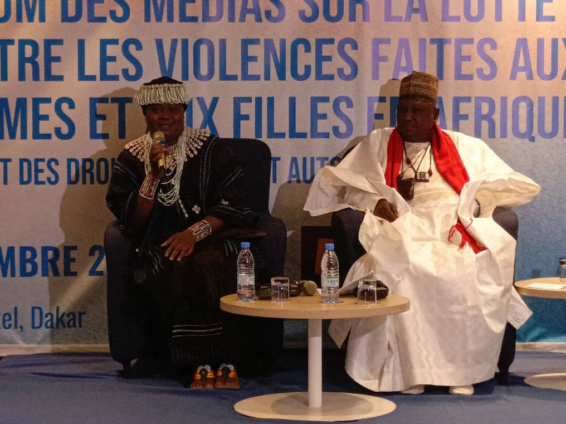
Audio By Carbonatix
Social and cultural transformation has been identified as a critical factor in promoting the rights of women and girls.
To deepen understanding of tradition’s role in combating gender-based violence, a forum organised by the Africa Media Network for Health & Environment Promotion (REMAPSEN) in Senegal brought together prominent traditional leaders, including Ahan Kalidji Beatrice, Queen of Oussouye, and M. Moussa Ndione, Djaraaf de Bargny, to discuss “Changing Social Norms by Traditional Leaders.”
Djaraaf de Bargny, M. Moussa Ndione, emphasised the role of traditional leaders as custodians of cultural norms in driving meaningful change.
He highlighted the need to address harmful practices such as early marriage, lack of education for girls, and Female Genital Mutilation (FGM), calling for a collective commitment to evolving mentalities.

“Our cultural identity must align with global approaches to gender equity,” he stated, urging communities to eradicate violence against women and girls (VAWG) and empower women as vital pillars of society.
Ahan Kalidji Beatrice shared her journey as an uneducated 14-year-old queen ascending the throne in 2000.
Reflecting on societal norms that initially hindered her education, she recounted the challenges of overcoming deeply entrenched biases.
“It was only after the passing of a community elder that I was able to broaden my horizons and pursue advocacy,” she revealed.
She emphasized the transformative power of education for girls, urging communities to empower women to achieve autonomy and train their children for self-reliance.
She also highlighted the dangers of verbal violence, warning of its role in tragic outcomes such as suicide, and likened spousal abuse to disrespecting one’s parents.

Acknowledging the contributions of UN Women in amplifying women’s voices, Her Royal Highness reiterated her commitment to advocacy, particularly against domestic violence and the mistreatment of girls as household help.
“If we continue treating domestic workers like slaves, soon, no one will have them,” she cautioned.
Both leaders underscored the importance of a unified approach to creating sustainable social change. While Djaraaf de Bargny stressed collective responsibility in transforming harmful norms, Ahan Kalidji Beatrice focused on the importance of education and addressing verbal and psychological abuse.

The forum, supported by UN Women and Fonds Français Muskoka, continues to call for eradicating violence against women and girls through education, advocacy, and collective transformation.
Organised by REMAPSEN, it seeks to address pressing issues of gender-based violence and promote female empowerment, leaving no one behind.
Latest Stories
-
Alavanyo Paramount Queen backs Asantehene in opposition to inclusion of Queenmothers in Houses of Chiefs
14 minutes -
OSP’s preventive actions saved Ghana millions – Sammy Darko
55 minutes -
Galamsey cuts off cocoa farms in Mfantseman, farmers suffer heavy losses
2 hours -
Ghanaian delegation set for January 20, 2026 trip to Latvia in Nana Agyei case – Ablakwa
3 hours -
Accra turns white as Dîner en Blanc delivers night of elegance and culture
5 hours -
War-torn Myanmar voting in widely criticised ‘sham’ election
7 hours -
Justice by guesswork is dangerous – Constitution Review Chair calls for data-driven court reforms
7 hours -
Justice delayed is justice denied, the system is failing litigants – Constitution Review Chair
7 hours -
Reform without data is a gamble – Constitution Review Chair warns against rushing Supreme Court changes
8 hours -
Rich and voiceless: How Putin has kept Russia’s billionaires on side in the war against Ukraine
8 hours -
Cruise ship hits reef on first trip since leaving passenger on island
8 hours -
UK restricts DR Congo visas over migrant return policy
8 hours -
Attack on Kyiv shows ‘Russia doesn’t want peace’, Zelensky says
9 hours -
Two dead in 50-vehicle pile up on Japan highway
9 hours -
Fearing deportation, Hondurans in the US send more cash home than ever before
9 hours

